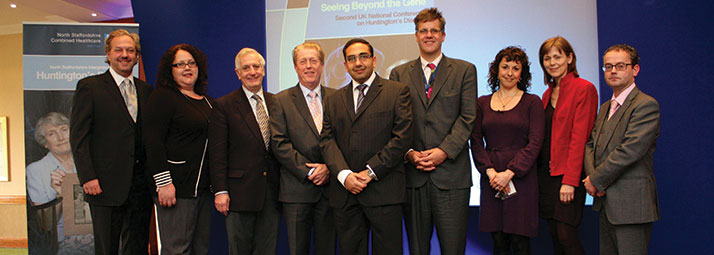
Having received overwhelming support and approval of the first national conference in 2010, the second event did not disappoint! With more than 160 attendees from all over the UK and Europe from a wide range of sectors, the attendance exceeded expectation. The conference was sponsored by a number of organisations from various fields, ranging from health care groups, support organisations and technical experts; both from the UK and other European countries. Excellent support and input were also received from relevant voluntary organisations.
Dr George El-Nimr, Consultant Psychiatrist and the conference organiser, began the day by presenting an overview of the epidemiology of Huntington’s Disease (HD) in a talk entitled “HD around the World”. This highlighted the importance of epidemiology in informing service planning and also to assist with the interpretation of potential preventative methods. He went on to discuss the change in attitudes towards positive predictive testing over time and across different countries. Increased testing will shed more light on the service needs of at risk individuals and asymptomatic abnormal gene carriers.
Charles Sabine, TV journalist, along with a carer from the neuropsychiatry HD services in Stoke-on-Trent delivered a session entitled “Personal perspectives, living with genetic test results”. Personal views of the different challenges raised by positive and negative HD test results were discussed in an interactive session that received excellent feedback. During this session the importance of collaborative working between patients, families, researchers and clinicians was emphasised.
Dr Oliver Quarrell, Clinical Geneticist, talked about predictive and pre-natal genetic testing in HD: practical and ethical challenges. The identification of the gene in 1993 allowed more widespread predictive testing and the guidelines for genetic testing were modified. Issues surrounding disclosure of reduced penetrance and intermediate allele results were also presented.
Dr David Craufurd, Consultant Neuropsychiatrist and Senior Lecturer in Medical Genetics at the University of Manchester talked about neuropsychiatric symptoms and their treatment. Dr Craufurd focused on mood changes, irritability and loss of motivation (apathy) being the most common and troublesome behavioural changes. There is some evidence that apathy and irritability are a direct consequence of the underlying neurodegenerative process, while depression and psychotic symptoms may reflect a distinct genetic predisposition for these disorders.
The afternoon session started with Mr Doug Feery, Barrister, who is a specialist in Court of Protection matters and has a particular interest in cases where there is a human rights element. The unprecedented change in the law affecting adults who lack capacity was presented. The introduction of the Human Rights Act, amendments to the Mental Health Act and the introduction of the Mental Capacity Act were discussed with special reference to patients with HD.
Professor Sarah Tabrizi, Professor of Clinical Neurology at UCL Institute of Neurology, talked about the TRACK-HD Study which commenced in 2008. TRACK-HD was designed to observe natural disease progression in premanifest and early stage HD with the aim of establishing sensitive and specific clinical and biological markers of disease progression. A new study, namely Track-On HD was also discussed. The aim of that study is to identify neural compensatory networks that may occur in the premanifest phase of neurodegeneration in HD.
Dr Hugh Rickards, Consultant Neuropsychiatrist and Honorary Reader at Birmingham University talked about the theoretical basis of abnormal behaviour. He highlighted the fact that the striatum is a “neuropsychiatric” brain region which contains neurons related to mood, cognition and movement. The issue of excluding HD patients from mainstream psychiatric services in the last 20 years was highlighted as a matter that will need addressing.
Professor Bernhard Landwehrmeyer, Professor of Neurology at Ulm University and the Chair of European Huntington’s Disease Network presented a talk entitled “Finding a Cure; Hopes and Challenges”. Professor Landwehrmeyer indicated that insight into critical mechanisms of disease derived from studies of experimental model systems of HD are important to study. He also discussed ENROLL-HD, a global prospective natural history study of people affected by HD that will accelerate research in the field of HD.
Professor Anne Rosser, Professor of Clinical Neuroscience and Joint Director of the University’s Brain Repair Group at Cardiff University, presented a talk on cell and tissue transplantation as a potential therapeutic strategy in neurodegenerative disorders, which offers to replace cells lost during the disease process.
The conference was a great success in supporting patients and families, informing professionals and raising awareness. The programme flowed excellently with a great mix of professional presentations from field experts to local carers and well known Huntington’s disease gene carriers who are dealing with the ramifications of being in such a difficult position.
Concurrent and subsequent feedback from delegates, sponsors and speakers was quite encouraging. This led to the ongoing planning for the third national conference that will take place next year. All presentations and videos from the day were made available for delegates after the event.